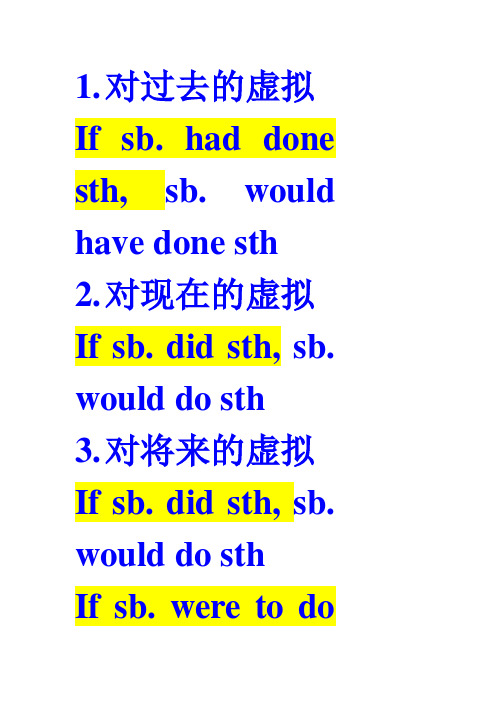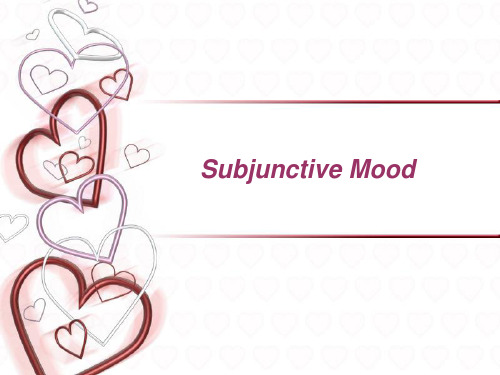虚拟语气15种句型
- 格式:ppt
- 大小:672.00 KB
- 文档页数:39

1.对过去的虚拟If sb. had done sth, sb. would have done sth2.对现在的虚拟If sb. did sth, sb. would do sth3.对将来的虚拟If sb. did sth, sb. would do sthIf sb. were to dosth, sb. would do sthIf sb. should do sth, sb. would do sth4.错综虚拟条件句(if+过去完成时, sb. would do sth)If the doctor had come sooner lastnight, Tom would be alive today.If you had studied hard at that time, you would be a key university student now.5.虚拟条件句,从句可以省略if,但谓语动词要部分倒装.6.含蓄虚拟条件句标志性词汇: without (如果没有), but for (要不是), otherwise/or (否则)***if条件句可以与without/butfor互相转换,意思相同。
7.表示建议\要求\命令等动词以及相应的名词引导的名词性从句,通常跟should结构. Insist/suggest/ad vise/command/or der/urge/recommend/require/requ est/propose that sb. should do sth ***insist做“认为”讲时,相当于think, 不用should结构. Suggest 做“暗示,表明”讲时,相当于imply, 不用should结构.8.常见的should 结构句型It’snecessary/natura l/probable(很可能)/should do sthIt is a pity/ a shame/ no wonder that sb. should do sth. 9.wish+宾语从句,要用虚拟语气.Wish that sb. had done sth (对过去虚拟) Wish that sb. did sth (对现在虚拟) Wish that sb. would do sth (对将来虚拟) 10.would rather 后的虚拟语气只有两种句型:would rather sb. did sth(对现在和将来虚拟)would rather sb. had done sth (对过去虚拟) 11.If only…! (虚拟语气)12.as if/ as though如果表示与事实相反的情况,要用虚拟语气.…as if sb. did sth (对现在虚拟) …as if sb. had done sth(对过去虚拟) …as if sb. would do sth(对将来虚拟)13.It is high/about time+虚拟语气It is high/about time that sb. did sth.It is high/about time that sb. should do sth (不能省略)。



常考虚拟语气句型第一种:由“ if ”引导的虚拟句子1. 与现在的事实相反:[If --- + were/did---, --- + would do---]If I were you , I would marry him. 如果我是你,就会嫁给他。
2. 与过去的事实相反:[If --- + had done---, --- +would have done---]If you had worked hard , you would have passed the exam.如果你用功学习,就会通过考试了。
3. 与将来的事实可能相反:[If ---+ should do---, ---+ would do---]If it should rain tomorrow , what would you do ? 如果明天下雨,你怎么办?第二种:用在表示要求、建议、命令等的动词或名词从句中,从句谓语形式为:“---(should ) + do sth”(在美语中should常省去) 。
insist (坚持) , suggest (建议) , order(命令) , propose (建议) , demand (要求) , command (命令) , advise (建议) , desire (要求、请求) , request (请求) , require (需要、要求) , ask (要求) , prefer (宁愿), recommend(推荐) , arrange ( 安排) , advocate ( 拥护、提倡) ,maintain(坚决主张)等后面的宾语从句中。
第三种:用在“It + be + important (,necessary , natural , essen tial , strange , absurd , amazing , annoying , desirable, surprising , vital , advisable , anxious , compulsory , crucial , imperative , eager , fitting , possible , impossible , improper , obligatory , probable , preferable , strange , urgent 等, 以及insisted , suggested , ordered , requested , arranged , recommended 等) + that ---”结构中的that 引导的主语从句中,从句谓语形式为:“---(should ) + do sth”(在美语中should常省去) 。


常用虚拟语气句型1.if条件句条件状语从句可分为真实条件句,即条件满足,事实就发生的情况;和非真实条件句,即与事实相反或难以实现的假设情况。
虚拟语气的基本句型,即是这种非真实条件状语从句。
If I had got up early, I wouldn’t have been late.If I were to do it, I should do it at once.【说明】①在非正式英语中,条件从句中的第一、第三人称单数主语后可用was代替were。
If I was you, I would accept the invitation.②主句中的would可用于各种人称,而should只用于第一人称。
③在主句中也可用情态动词could,might代替would,should。
If I had had enough time, I might have done it better.④条件从句中的谓语动词含有were,had,should时,可以省略从属连接词if,然后采用倒装结构,把were,had,should移到主语前面。
Should you pass this way, do drop in for a visit.= If you should pass this way,…… Had I known it, I wouldn’t had made such a silly mistake.= If I had known it,…… Were it left to me to decide whether I should have a job immediately or go on to study at college, I wouldn’t hesitate a moment to choose the latter.= If it were left to me to decide……..⑤在同一个句子中不能一部分表示真实条件,另一部分表示非真实条件。
虚拟语气归纳大全TPMK standardization office【 TPMK5AB- TPMK08- TPMK2C- TPMK18】虚拟语气的用法归纳1、虚拟条件句的三种基本类型:与现在事实相反、与过去事实相反、与将来事实相反。
条件句有真实条件句和非真实(虚拟)条件句两种。
真实条件句所表示的假设是有可能发生的,而非真实条件句则通常表示一种假想,与事实相反或不大可能会发生:If I have time, I will go with them. 假若我有时间,我就同他们去。
(陈述语气)If I were you, I would go with them. 假若我是你,我就同他们去。
(虚拟语气)▲与现在事实相反若与现在事实相反,条件从句的谓语用过去式(be通常用were),主句谓语用“should (would, could, might)+动词原形”:If I knew her number ,I could ring her up. 要是我知道她的电话号码,我就可以给她打电话了。
(可惜我不知道)▲与过去事实相反若与过去事实相反,条件从句的谓语用过去完成时(had+过去分词),主句谓语用“should (would, could, might)+have+过去分词”:If I’d left sooner,I’d have been on time. 要是我早点动身,我就准时到了。
(但我动身太迟了)▲与将来事实相反若与将来事实相反,条件从句的谓语用过去式(be通常用were),主句谓语用“should (would, could, might)+动词原形”:If I asked him,I’m sure he’d help us. 如果我向他提出要求,肯定他会帮助我们。
(不过我不打算这样做)注:几点特别说明① 主句谓语中的should主要用于第一人称后。
would, might, could的大致区别是:would表示结果,might表示可能性,could表示能力、允许或可能性。
高中英语知识点归纳虚拟语气的用法及常见句型高中英语知识点归纳:虚拟语气的用法及常见句型引言:英语语法中,虚拟语气是一种特殊的语态,在表达假设、愿望、建议、命令等方面非常常见。
了解虚拟语气的用法和常见句型可以帮助学生在英语交流中更准确地表达自己的意思。
本文将介绍虚拟语气的基本用法和常见的句型。
一、与现在事实相反的虚拟语气1. 形式:if + 动词的过去式,主句用“should/could/would/might + 动词原形”形式。
例如:If I were you, I would tell her the truth.(如果我是你,我会告诉她真相)2. 常见句型:a. It's time (that) + 主语 + 过去式。
(是时候…了。
)例如:It's time that we left for the airport.(是时候我们离开机场了。
)b. If only + 主语 + 过去式 or 过去完成式。
(要是…就好了。
)例如:If only he had listened to my advice!(要是他听了我的建议就好了!)c. I wish/If only + 主语 + 过去式 or 过去完成式。
(我希望…)例如:I wish I had more time to study.(我希望我有更多时间学习。
)二、与过去事实相反的虚拟语气1. 形式:if + 主语 + had + 过去分词,主句用“should/might + have + 过去分词”形式。
例如:If he had known about the party, he would have come.(如果他知道派对的话,他就会来的。
)2. 常见句型:a. If it had not been for + 名词,主语 + would/could/might not have + 过去分词.(如果不是因为…)例如:If it had not been for your help, I would not have passed the exam.(如果不是因为你的帮助,我不会通过考试的。
虚拟语气超详细讲解虚拟语气类型一、(should)+do1、<无论词性,无论其从句,一律用should+do, should可省略>建议advise, suggest, propose,recommendn命令order, command请求ask, demand, require, request坚持insist 敦促urge 希望desire 指示direct**suggest表“暗示”insist表“坚持认为”不用虚拟语气The man insisted that he had never stolen the moneyThe smile on his face suggested that he had passed the examination.I suggested that he __________(stay)where he is.It is suggeated that he __________where he is.My suggestion is that he _________where he is.My suggestion that he ________where he is has been accepted.2、It is/was + 紧急,重要,奇怪/建议,要求,命令(带感情色彩)+that从句①important,natural,strange ,necessary,surprised, crucial, essential,②requested/suggested/desired/pro posed/ recommended/orderedIt is ordered/important that we (should) stay where we are.类型二Were 型虚拟语气基本原则:对现在虚拟:过去时did/were对过去虚拟:过去完成时had done对将来虚拟:过去时did/were to do或者would, might, could +动词原形1. if 条件句中的虚拟时间从句谓语形式主句谓语形式将来动词过去式(be用were)should + 动词原形were to + 动词原形would / should / might / could + 动词原形现在动词过去式(be 用were) would / should / might / could + 动词原形过去had +动词过去分词would / should / might / could have + 动词过去分词1.1 与现在事实不一致,其句型为:If +主语+did ,主语+should (could, would, 或might )+do .If I were you, I would study hard. (可倒装)If it rained, I would not be here now.1.2 与过去事实不一致,句型为:If +主语+had +done ,主语+should (could, would, 或might )+have +done. If the doctor had come last night, the boy would have been saved. (可倒装)1.3 将来事实不一致,句型为:If should were to 主语++do ,主语+should (could ,would, 或might )+do. If it should rain tomorrow, we would stay at home.(可倒装)If I were to go to the moon one day, I could see it with my own eyes.(可倒装) If you missed the film to night, you would feel sorry.(混合虚拟)难点:①在条件句中如果出现were, had, should 可省去if ,将主语与这些词倒装 Had the doctor come last night , the boy would havesaved.Were I to go to the moon one day , I would see it with my own eyes.Should it rain tomorrow , we would stay at home.②当条件状语从句表示的行为和主句表示的行为所发生的时间不一致时,被称为“错综时间条件句”,常常表现为if+过去虚拟+主句现在虚拟If you had followed my advice, you would be better now.If you had studied hard before, you would be a college student now.2. wish 后面的宾语从句中与现在愿望不一致: 主语+did ; I wish I were you.与过去愿望不一致: 主语+had +done ;I wish I had visited the white House when I was in the states.与未来愿望不一致: 主语+would (could )+do 。